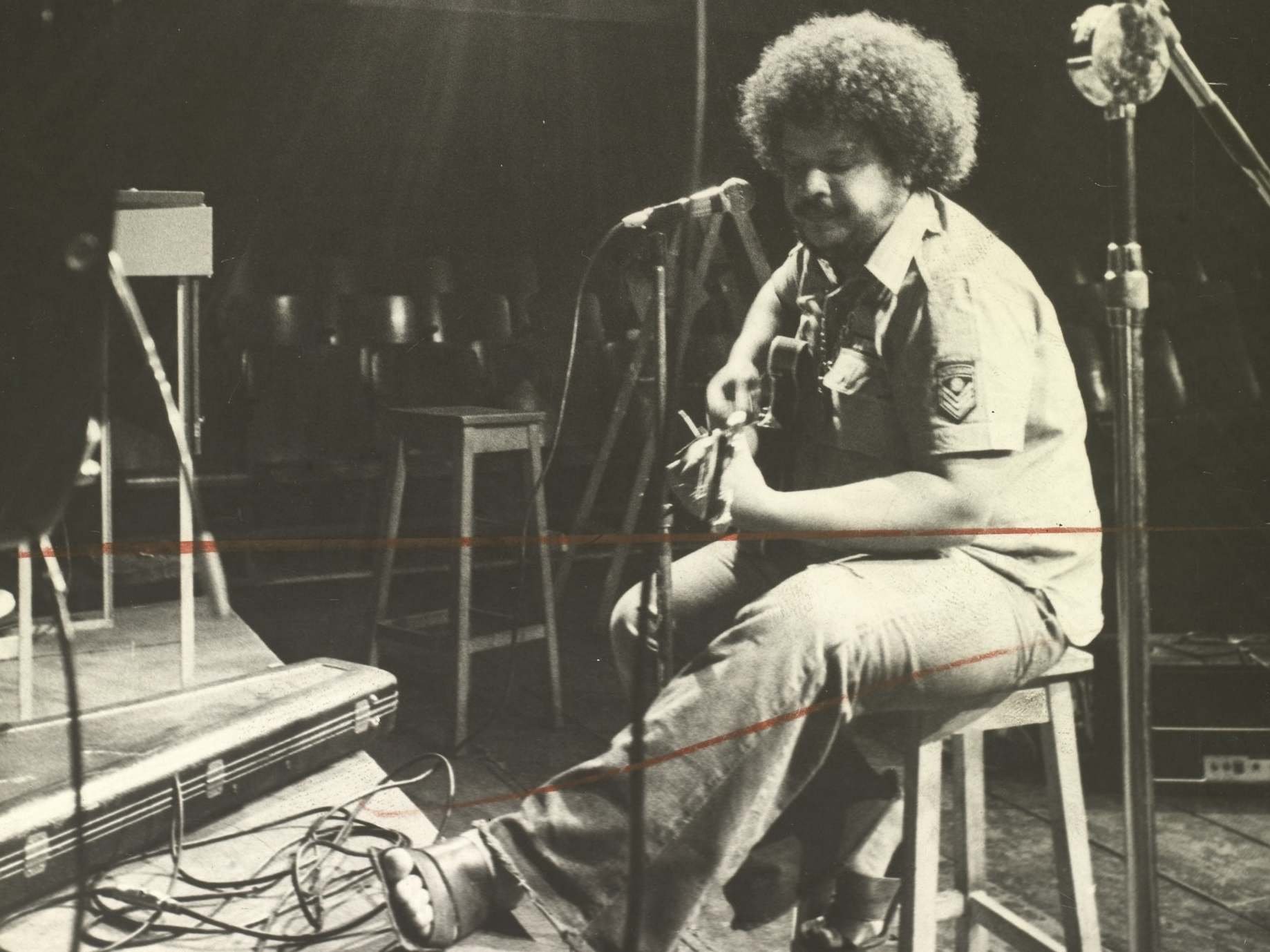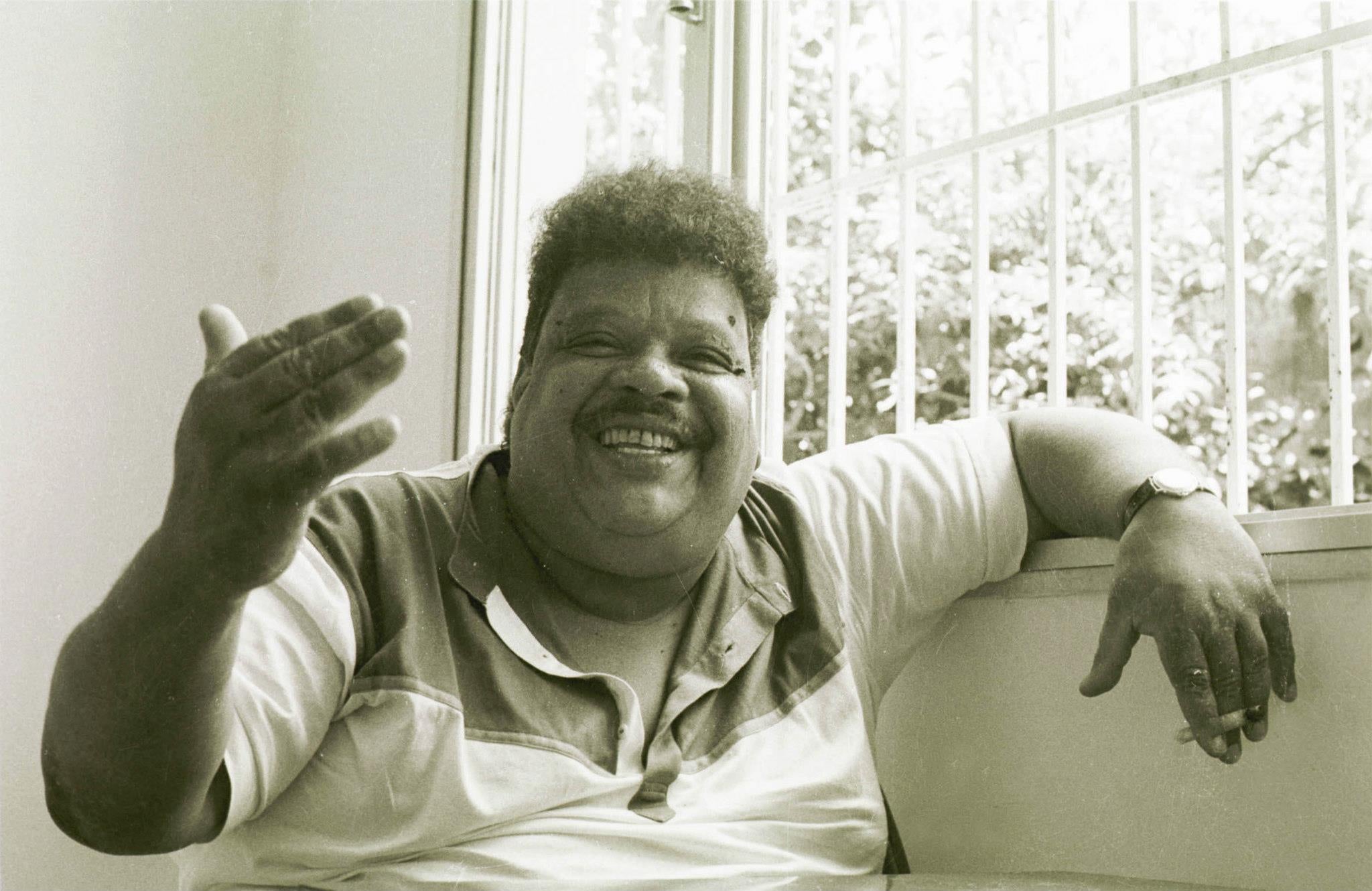Drugs, aliens and psychedelia: When a cult possessed Brazil’s greatest musician
After flicking through an outlandish manifesto under the influence of mescaline, Tim Maia embarked on a frenzied period of divinely inspired artistry, writes Jake Cudsi

Tim Maia had already lived a storied existence by the time he picked up a book laying down the doctrines of “Rational Culture”. One of Brazil’s greatest living artists, he found the manifesto in his friend Tiberio Gaspar’s house, flicking through it under the influence of some mescaline he’d taken. By mid-1975, Maia had converted to a cult, and was producing audio propaganda at a rate of knots.
Erratic decisions and behaviour followed Maia throughout his career. But we can’t blame the drugs for that (although they certainly helped). In 1974, Maia had been let go from his contract at Polydor, after demanding they let him release a double-album, leaving him free to pursue the project he wanted.
Before the events of 1974, he’d garnered a reputation as the foremost Afro-Brazilian artist working in the country, constantly developing new sounds, blending the influence of American rock and more traditional Brazilian pop, samba and baiao.
It didn’t always look like success would come to the Rio native. Enraptured and entranced by early rock, Maia set up a band with his mates (with future star Roberto Carlos among them) called The Sputniks. It didn’t work out – with Maia leaving in a fit of anger after Carlos had appeared solo on a popular music show, Clube do Rock – and nor did Maia’s subsequent stay in the US. Having spent time couchsurfing and working odd-jobs, he was arrested on possession charges, spending six months in jail before he was promptly deported back to Brazil.
He had gone to the US with the vague intent of becoming a rockstar. But he didn’t have any of the tools to do so, nor a plan to implement. So, kicked out of the US and his first band, Maia was struggling to find where he fitted in. Stubbornness and overambition dogged his career, but they were great strengths in getting it started, and propelling it in the future. According to the WaxPoetics writer Allen Thayer, Maia travelled to Sao Paulo searching for his old bandmate, Carlos. Carlos had found fame, and Maia hoped to show him a demo tape. The plan miraculously worked, and Maia secured studio time.
This was 1968. Maia’s career was finally launched, but he was no closer to enjoying success. He had immense difficulty merging the soul music he liked to make with the popular bossa nova sound ubiquitous on Brazilian airwaves.
But, as would be the case so often in his career, Maia was just ahead of the times. Eventually, fellow artists and producers cottoned onto the sound he was pushing, helping secure a record deal and push Maia into the mainstream. His 1970 debut album Tim Maia spent 24 weeks at the top of the charts.
Four years, three albums and copious amounts of drugs later, and we find ourselves back at Gaspar’s house, where Maia’s musical odyssey is about to take a serendipitous turn for the spectacularly out of the ordinary.
Maia spent two days at home poring over every page of Universe in Disenchantment. At the height of his stardom, Brazil’s biggest artist had converted to a cult.
Not a whole lot was known about the cult and its founder, Manoel Jacintho Coelho, other than the books he had printed proselytising his new religion. The sect offered salvation, much like any religion, but had some interesting ideas on how to achieve that.
Universe in Disenchantment attempts to explain why humans are suffering on Earth. According to the cult’s teachings, humans are in fact extraterrestrial beings from The Superior Rational. We humans were banished to Earth, but will soon return on spaceships. In order to return, though, humans must endure rational immunisation. Handily, the way to do this is to read plenty of Universe in Disenchantment.
Like in all his endeavours, Maia put his heart and soul into his devotion to the cult. The drug intake stopped completely and he purged himself of material possessions. Tim Maia, a biopic released in 2014, exhibits how he had started dressing solely in white.

But his time practising the cult’s way of life seemed to give his music increased vigour, something at odds with the rigid policing of art usually enforced by sects.
“Read the book, the only book,” Maia implores on the raga-esque “Racional Culture”, something of an unofficial anthem for the cult. The 12-minute funk beat is punctured sporadically with hymnal intonations, and plays like a jam session gone beautifully awry.
It set the tone for Racional Vol 1 and Racional Vol 2, the two albums Maia would release while a member of the cult. Brazilian funk, replete with electric guitars, is huskily drawled over with whole passages lifted from Universe in Disenchantment.
The undisputed smash-hit – well, only hit – from this brief stint as chief-propagandist is “Que Beleza”, a perfect distillation of the sound Maia worked tirelessly to produce. A hybrid of America’s drug-fuelled psychedelia and Brazil’s bossa nova, baiao borrowing funk. Allmusic’s Matt Rinaldi calls it “lunatic gospel”.
His devotion to the cult wasn’t just limited to making great music, though. According to the journalist Nelson Motta, Maia would send copies of Universe in Disenchantment (in its original Portuguese) to other famous musicians. These included John Lennon, who reportedly responded with a note reading: “Dear freak, I don’t understand Portuguese”, accompanied by a picture of Lennon stark naked.
Maia soon quit the cult almost as abruptly as he’d entered it; disenchanted by, among other things, their insistence he only plays Racional Culture benefit gigs. His time with the cult produced two albums and approximately zero critical or commercial success. But he had achieved something bigger, says the music critic Tarik de Souza. He had “succeeded in making the unmusical musical”.
Racional Vol 1 and Racional Vol 2 are the only surviving material from Maia’s frenzied period of divinely inspired artistry. The rest was burnt, fragments of it held in smoke escaping into the atmosphere, maybe one day making it to the Superior Rational where they can be enjoyed by a select few.
Maia went on to have a hugely successful career, being a trailblazer, a radical, a rebel and becoming one of the icons he had always pushed against, stretching the limits and restrictions of traditional Brazilian music into new, unfamiliar territory.
Join our commenting forum
Join thought-provoking conversations, follow other Independent readers and see their replies
Comments